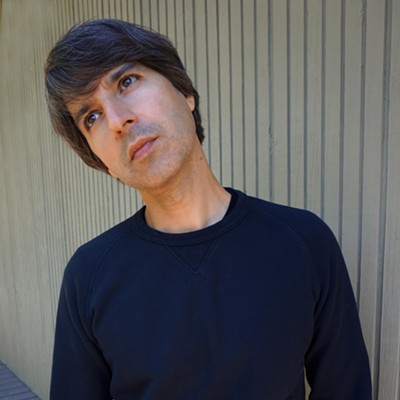For 25 arguments in favor of the human hand leaving its mark, visit the UA Poetry Center's Celebrating Bukowski, an exhibition of works by poet Charles Bukowski, opening Friday, July 16, at 1600 E. First St.
Depending on who you ask, Bukowski was 1) a misogynistic, self-obsessed alcoholic, 2) a genius who saved poetry from itself, or 3) both. It doesn't really matter whether you love him, hate him, find him forgettable or don't know who he is; the UA's collection--which includes rare books, books handmade by the remarkable Black Sparrow Press and books illustrated by R. Crumb (introduced to mainstream America through the recent film, American Splendor)--demonstrates the power of a real, live book.
"We have 25 books that really span the career of Charles Bukowski as a writer," says Theresa Sotto, library assistant and UA graduate student. "Some of them are available most anywhere, but many of them really rare, with beautiful covers.
"Black Sparrow Press published the majority of his work prior to when they folded in 1994. It was a small, independent publisher, and the woman who designed the book covers was the wife of the owner of the press. You can really see the artist's hand in these books."
One of the highlights of the collection, It Catches My Heart in Its Hands--an elongated book comprised of heavy pages in many different colors--had a run of only 777; another had a run of 800. Several of the books are valued in the thousands of dollars, and there's a Tucson connection, too, since Black Sparrow Press was at one time based here.
"Bukowski was a very interesting character," Sotto says. "He led a very colorful life, and a lot of people know him by his reputation as a alcoholic. He wrote about really controversial issues, and initially he wasn't very successful in getting them published because of explicit sex imagery, very graphic details about depression or alcoholism. ... The thing that I think makes him good is that he isn't afraid to write down, in a very direct way, what he's thinking about. In some interview I read, he spoke about how he doesn't think there's a lot of good poetry out there because people can't write in a simple way. He really favored language of the colloquial kind; as he was living in L.A., he worked a lot of menial jobs--at a dog biscuit factory, in a post office--and that tends to come to the poems. He talks about class, relationships, and incorporates a lot of humor and sarcasm."
If you're a Bukowski fan, you'll appreciate how the rough, handmade nature of some of the chapbooks fits so well with the poems stamped inside, and how the publisher--a company whose success was a direct result of their belief in a single, unknown poet--recorded the process of the making of the book (the colors used, the bugs around) alongside the finished works of Bukowski himself.
"His unique relationship with the publisher is good to note," says Sotto. "Black Sparrow Press came into being because of Charles Bukowski. The founder, James Martin, came across Bukowski's work in a couple of small publications and approached him and said, 'Hey, I want to publish your work.' At the time, Martin was office manager of an office supply company, but he was an avid reader and book collector. He sold some first edition works of D.H. Lawrence, and used the $50,000 he got for them to start the press. In the beginning, he would just publish a single poem and hand it out to people, but as a result of the fame that Charles Bukowski eventually received, the press ended up making a lot of money and doing really well. Martin said that there were several years that the press made $1 million, which is pretty amazing for a small publishing company that just had faith in Bukowski's work."
Celebrating Bukowski is being exhibited in conjunction with The Loft's screening of the documentary Bukowski: Born Into This, and will run through Aug. 16. The Poetry Center's hours are 9 a.m. to 8 p.m. Monday through Thursday; 9 a.m. to 5 p.m. Friday; and 1 to 4 p.m. Saturday. For more information, call 626-3765.







